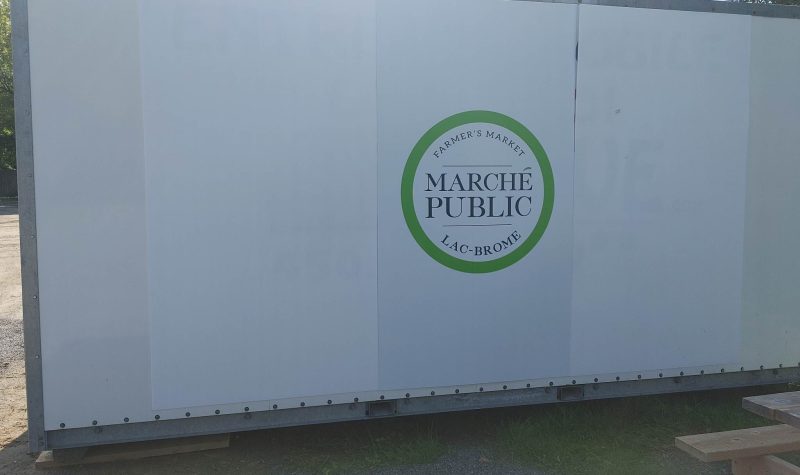Brome Lake, Frelighsburg, Farnham, and Sutton are just some of the Brome-Missisquoi villages that have officially launched their farmer’s markets for the summer and early fall season. The farmer's markets in the region have been slowly opening up since the beginning of June and participants are now set to welcome the hustle and bustle they bring to their villages.
Farmer’s markets are known for being a place where people can stock up on fresh local goods and support farmers and producers, but over the years they have grown to be an important platform that builds a sense of community around food and a relationship between producers and consumers that allows small-scale farming to thrive in the Eastern Townships.
Remi Fournier, owner of Au coeur du pinnacle in Frelighsburg, and Jean-Martin Fortier, owner of farm Les Jardins de la Grelinette in Stanbridge East, said that farmer's markets continue to provide producers with an extra source of income throughout the summer, but it’s the opportunity that these markets provide for producers to work with the community in order to develop a thriving food system that make them an important investment.
“If you talk to the vast majority of producers, the farmer’s market season is quite important. These are not typically large sized-businesses, we are all small business entrepreneurs and we are producing for the community. It’s important in two ways: first it helps us connect with the community and our consumers, which is an experience in itself for the customers, and second, it’s not a secret it’s a way to sell direct. It finances a lot of our operations,” said Fournier, an ecological vegetable producer that takes part in the Frelighsburg farmer’s market.
Recognizing that the population only gets to experience the farmer’s markets a few months out of the year, Fournier explained that sometimes people struggle to get out of their typical routine of shopping at the grocery stores. Once people have the opportunity to experience the the markets however, they almost become imbedded in the “culture” of the community, encouraging people to come together and invest in their local economy.
“It’s that one time at the beginning of the season that usually triggers the whole summer routine. You wake up early, you go to the market, you buy the nicest products that are fresh, it’s such an experience in your weekend. You can share those products with your loved ones, cook, and enjoy those flowers, it brings a lot of happiness. Force yourself a bit for the first few times and then it becomes a regular habit and it makes an entire difference,” he highlighted.
Fournier mentioned that the farmer’s markets may not be the “greatest revenue driver” for producers, but they do provide educational opportunities that help build a community willing to invest in the local food system of Brome-Missisquoi.
“You go to a [grocery store] and you’re doing a transaction, basically. At the farmer’s markets it’s always a conversation, even to the point where sometimes there is a line-up of people and everybody is chatting around,” said Fournier. “It’s completely different and that conversation is an opportunity to educate on the different products, the way it’s made, the way it’s harvested. (…) If you don’t have these conversations, you can’t educate and that is why the farmer’s markets are there.”
Jean-Martin Fortier, an organic vegetable producer for 18 years, has been going to the Brome Lake farmer’s market since its early beginnings. He described the market as “special” in the sense that most of the vendors have been there for years. The market originally took place on Maple Street in Knowlton before it was moved behind Theatre Lac-Brome a couple of years ago. Fortier highlighted that he and other producers that participate in the market have noticed a dip in attendance so far this year, but they hope the town will continue to invest time and energy in promoting the market so that it can play the important role that it has in the community for all of these years.
“The farmer’s market is a great way to build community, to meet with the people and connect, to just have a chat. (…) For all of these years that we have been going, it’s really the community aspect that really strikes me as being the key point,” said Fortier.
Fortier referred to the sense of community between the food, the farms, and the consumers as the “holy trinity” that allows a local food system to thrive.
“Small farms, when they can meet with the people that eat their food (…), all of that is a part of a local food system. It really all starts with the farmer’s markets so it needs to be happening, it needs to be thriving, we need to have support, but we also need to make it Knowlton,” he explained.
Fortier noted that people have taken advantage of the farmer’s markets in the past and that he expects the same for the future, but these markets really pull people together by serving as a yearly reminder of the significant role they play in making small-scale farming possible.
“I don’t know if people understand this, but three times a day they can totally impact the food system positively by purchasing from a local farm or a local store in Knowlton. (…) I think it’s good for people to hear, again, how important their presence it is and how impactful their dollar is when they come and purchase something from the farms,” he said.
For more information about the local farmer’s markets check in with your municipality or head on over to Tourism Brome-Missisquoi’s website for more information.
Listen to the full interview below:


